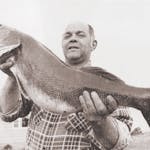 See
more of the story
See
more of the story
On May 13 I woke up with an unusual sensation in my right ear, which felt as if it were filled with water, as sometimes occurs while swimming.
This was the Monday after this year's fishing opener, and as I pounded the palm of my right hand against the side of my head, trying to free up whatever was blocking my ear, I recalled that the day earlier, while waiting to load my boat from Upper Red Lake, a truck had backfired near me, producing a sound similar to that of a gunshot.
Other than being startled, I didn't think much of it. Now I wondered whether that was the reason my right ear felt stuffed and, worse, was producing no sounds I could decipher — none.
Like a lot of hunters and shooters, particularly those who grew up when hearing protection wasn't emphasized to the degree it is now, I was aware even before this malfunction that my hearing wasn't great.
Rifle hunting for deer since I was 12 was one reason. Being able to hear while sitting in a deer stand is critical to success, and relatively few hunters — including me, for most of my life — want to cover their ears to protect against the sound of gunfire if it reduces their chances of hearing an approaching whitetail.
That said, most deer hunters kill animals with a single shot. So whatever damage a rifle might do to one's hearing, at least it occurs only once, or at most a handful of times a year.
The type of hunting that really threatens a shooter's hearing is instead the type that begins one-half hour before sunrise Saturday, when ducks and geese become legal fare in Minnesota.
It's then that some hunters will shoot a box of 25 shells or more — bang, bang, bang — perhaps because teal, wood ducks, mallards or ringnecks are plentiful where they're hunting. Or perhaps because they are not very good wingshooters.
Either way, the repetitive blasting, over a lifetime, can take a toll on hearing.
Unfortunately for me, the right ear that had gone suddenly deaf in May had been my better ear. I knew that because the hearing capability imbalance had been obvious to me for years, and because an audiometry exam some years ago confirmed it.
Which made sense because I'm righthanded and because, ironically, hearing loss due to rifle or shotgun shooting typically accrues most not to the ear nearest the gun, but the one opposite from it. Consequently, my left ear, which on that fateful morning in May was yielding the only sounds I could hear, had already been significantly compromised.
Still, no matter my shooting history, losing hearing in one ear overnight was troubling. I called my doctor for an appointment and after a brief phone consultation was scheduled immediately for an audiometry exam with an audiologist and a follow-up appointment with an ear, nose and throat doctor, aka an otolaryngologist.
Haste was needed, I would learn, because the tiny hair cells that are present in each ear are critical to hearing, and once they are damaged they can't be repaired or replaced, meaning hearing loss like I was experiencing — called sudden sensorineural ("inner ear") hearing loss — could be permanent.
As I expected I would, I did crummy on the hearing test. My right ear was a virtual no-show, and my left ear, while better, was far from good. I would learn from the ear, nose and throat physician that in some cases of sudden unilateral hearing loss (which is rare and strikes only about 4,000 people a year) inflammation is the cause, and in those instances, a two-week course of steroids can help restore some or most hearing.
Other explanations for the loss include a virus, an infection or the presence of a tumor. In many cases, however, as in mine, the cause is unknown and the hearing loss proves permanent.
Two weeks passed, with no help from the steroids. Subsequently, I ended up at Mayo Clinic, where a steady-handed ear, nose and throat doctor, tossing the equivalent of an otolaryngologist's Hail Mary pass, stuck a long needle into my right eardrum twice over the course of a couple weeks, filling it directly with steroids.
That didn't work either, and while I retain some hearing in my right ear, perhaps marginally regained by the treatments, it remains severely compromised.
The sudden sensorineural hearing loss I experienced in May probably would have occurred irrespective of my hunting history or the explosive crack of the backfiring truck I heard May 12. But the loss's overall effect on my hearing would have been mitigated if the hearing in my left ear was better.
Do yourself, and your ears, a favor: While hunting or shooting, especially while banging away multiple times at ducks and geese, wear hearing protection. But understand that some muffs and other, similar hearing-protection gear you see in sporting goods stores won't by themselves give you the protection you need.
Muffs, for example, should in most cases also be worn with high-quality ear plugs.
Better yet, get some custom-molded hearing protectors that fit inside your ears, preferably those that shut down loud sounds like gunfire. They might run you $600-$800 — but hearing aids like I will probably need can cost 10 times that amount.
Finally, make sure your kids and other young people in your charge practice ear safety, not just while hunting, but while operating lawn mowers, chain saws, leaf blowers, or while attending concerts.
The alternative — continually saying, "I'm sorry, what did you say?'' — is a drag.
Dennis Anderson • 612-673-4424






